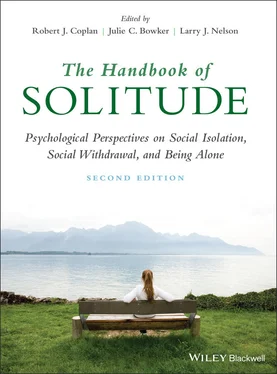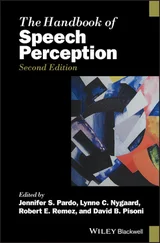8 Booth‐LaForce, C., Oh, W., Kennedy, A.E., Rubin, K.H., Rose‐Krasnor, L., & Laursen, B. (2012). Parent and peer links to trajectories of anxious withdrawal from grades 5 to 8. Journal of Clinical Child and Adolescent Psychology, 41, 138–149.
9 Bowker, J.C., Ojo, A.A., & Bowker, M.H. (2016). Perceptions of social withdrawal during emerging adulthood in Lagos, Nigeria. Journal of Adolescence, 47, 1–4.
10 Bowker, J.C. & Raja, R. (2011). Social withdrawal subtypes during early adolescence in India. Journal of Abnormal Child Psychology, 39, 201–212.
11 Bronfenbrenner, U., & Morris, P.A. (2006). The bioecological model of human development. In R.M. Lerner, & W. Damon (Eds.), 6th ed. Handbook of Child Psychology. (pp. 793–828). Hoboken, NJ: Wiley.
12 Chao, R.K. (1994). Beyond parental control and authoritarian parenting style: understanding Chinese parenting through the cultural notion of training. Child Development, 65, 1111–1119.
13 Chen, X. (2010). Socio‐emotional development in Chinese children. In M.H. Bond (Ed.), The Oxford Handbook of Chinese Psychology (pp. 37–52). New York, NY: Oxford University Press.
14 Chen, X. (2012). Culture, peer interaction, and socioemotional development. Child Development Perspectives, 6, 27–34.
15 Chen, X. (2015). Exploring the implications of social change for human development: Perspectives, issues and future directions. International Journal of Psychology, 50, 56–59.
16 Chen, X. (2019). Culture and shyness in childhood and adolescence. New Ideas in Psychology, 53, 58–66.
17 Chen, X. (2019). Exploring cultural meanings of adaptive and maladaptive behaviors in children and adolescents: A contextual‐developmental perspective. International Journal of Behavioral Development, 44, 256–265.
18 Chen, X., Cen, G., Li, D., & He, Y. (2005). Social functioning and adjustment in Chinese children: the imprint of historical time. Child Development, 76, 182–195.
19 Chen, X., DeSouza, A.T., Chen, H., & Wang, L. (2006). Reticent behavior and experiences in peer interactions in Chinese and Canadian children. Developmental Psychology, 42, 656–665.
20 Chen, X., Dong, Q., & Zhou, H. (1997). Authoritative and authoritarian parenting practices and social and school performance in Chinese children. International Journal of Behavioral Development, 21, 855–873.
21 Chen, X. & French, D.C. (2008). Children's social competence in cultural context. Annual Review of Psychology, 59, 591–616.
22 Chen, X., Fu, R., Li, D., Chen, H., Wang, Z., & Wang, L. (2020). Behavioral inhibition in early childhood and adjustment in late adolescence in China. Child Development. doi:10.1111/cdev.13463
23 Chen, X., Hastings, P.D., Rubin, K.H., Chen, H., Cen, G., & Stewart, S.L. (1998). Child‐rearing attitudes and behavioral inhibition in Chinese and Canadian toddlers: A cross‐cultural study. Developmental Psychology, 34, 677–686.
24 Chen, X. & Li, D. (2012). Parental encouragement of initiative‐taking and adjustment in Chinese children from rural, urban, and urbanized families. Journal of Family Psychology, 26, 927–936.
25 Chen, X. & Liu, L. (2016). Culture, peer relationships, and developmental psychopathology. In D. Cicchetti (Ed.). Developmental Psychopathology (pp. 723–769). Hoboken, NJ: Wiley.
26 Chen, X., Rubin, K.H., & Li, B. (1997). Maternal acceptance and social and school adjustment in Chinese children: a four‐year longitudinal study. Merrill‐Palmer Quarterly, 43, 663–681.
27 Chen, X., Rubin, K.H., & Sun, Y. (1992). Social reputation and peer relationships in Chinese and Canadian children: a cross‐cultural study. Child Development, 63, 1336–1343.
28 Chen, X. & Schmidt, L. (2015). Temperament and personality. In M.E. Lamb (Vol. Ed.) & R.M. Lerner (Series Ed.), Handbook of Child Psychology and Developmental Science, Vol. 3, Socioemotional Processes (7th edition) (pp. 152–200). Hoboken, NJ: Wiley.
29 Chen, X. & Tse, H.C. (2008). Social functioning and adjustment in Canadian‐born children with Chinese and European backgrounds. Developmental Psychology, 44, 1184–1189.
30 Chen, X. & Tse, H.C. (2010). Social and psychological adjustment of Chinese Canadian children. International Journal of Behavioral Development, 34, 330–338.
31 Chen, X., Wang, L., & Cao, R. (2011). Shyness‐sensitivity and unsociability in rural Chinese children: relations with social, school, and psychological adjustment. Child Development, 82, 1531–1543.
32 Chen, X., Wang, L., & DeSouza, A. (2006). Temperament and socio‐emotional functioning in Chinese and North American children. In X. Chen, D. French, & B. Schneider (Eds.), Peer Relationships in Cultural Context (pp. 123–147). New York: Cambridge University Press.
33 Chen, X., Zhang, G., Liang, Z., Zhao, S., Way, N., Yoshikawa, H., et al. (2014). Relations of behavioral inhibition with shyness and social competence in Chinese children:moderating effects of maternal parenting. Infant and Child Development, 23, 343–352.
34 Chen, X. (2018). Culture, temperament, and social and psychological adjustment. Developmental Review, 50, 42–63.
35 Chen, X., Chen, H., Li, D., & Wang, L. (2009). Early childhood behavioral inhibition and social and school adjustment in Chinese children: aA five‐year longitudinal study. Child Development, 80, 1692–1704.
36 Cole, M. & Cagigas, X.E. (2010). Cognition. In M.H. Bornstein (Ed.), Handbook of Cultural Developmental Science (pp. 127–142). New York: Psychology Press.
37 Colonnesi, C., Bögels, S. M., de Vente, W., & Majdandžić, M. (2013). What coy smiles say about positive shyness in early infancy. Infancy, 18, 202–220.
38 Colonnesi, C., Napoleone, E., & Bögels, S. M. (2014). Positive and negative expressions of shyness in toddlers: are they related to anxiety in the same way? Journal of Personality and Social Psychology, 106, 624.
39 Cooley, C.H (1902). Human Nature and Social Order. New York: Scribner’s.
40 Coplan, R.J., & Armer, M. (2007). A "multitude" of solitude: a closer look at social withdrawal and nonsocial play in early childhood. Child Development Perspectives, 1, 26–32.
41 Coplan, R.J., Girardi, A., Findlay, L.C., & Frohlick, S.L. (2007). Understanding solitude: young children's attitudes and responses toward hypothetical socially withdrawn peers. Social Development, 16, 390–409.
42 Coplan, R.J., Liu, J., Ooi, L.L., Chen, X., Li, D., & Ding, X. (2016). A person‐oriented analysis of social withdrawal in Chinese children. Social Development, 25, 794–811.
43 Coplan, R.J., Ooi, L.L., & Baldwin, D. (2019). Does it matter when we want to be alone? exploring developmental timing effects in the implications of unsociability. New Ideas in Psychology, 53, 47–57.
44 Coplan, R.J., Ooi, L.L., Xiao, B., & Rose‐Krasnor, L. (2018). Assessment and implications of social withdrawal in early childhood: a first look at social avoidance. Social Development, 27, 125–139.
45 Coplan, R.J., Prakash, K., O'Neil, K., & Armer, M. (2004). Do you "want" to play? Distinguishing between conflicted shyness and social disinterest in early childhood. Developmental Psychology, 40, 244–258.
46 Coplan, R.J., Rose‐Krasnor, L., Weeks, M., Kingsbury, A., Kingsbury, M., & Bullock, A. (2013). Alone is a crowd: social motivations, social withdrawal, and socioemotional functioning in later childhood. Developmental Psychology, 49, 861–875.
47 Coplan, R.J. & Weeks, M. (2010). Unsociability in middle childhood: conceptualization, assessment, and associations with socioemotional functioning. Merrill‐Palmer Quarterly, 56, 105–130.
48 Coplan, R.J., Zelenski, J.M., & Bowker, J.C. (2018). Leave well enough alone? The costs and benefits of solitude. In J.E. Maddux (Ed.), Subjective Well‐Being and Life Satisfaction (pp. 129–147). New York: Routledge/Taylor & Francis Group.
Читать дальше




![О Генри - Справочник Гименея [The Handbook of Hymen]](/books/407356/o-genri-spravochnik-gimeneya-the-handbook-of-hymen-thumb.webp)







